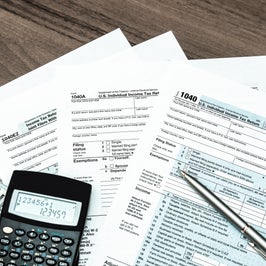What's the Average Tax Refund?

Over the last few years, the average tax refund has been more than $2,000, according to the IRS.
That’s a nice cash windfall that many American households have come to expect — the IRS issued millions of tax refunds in 2021.
2022 average tax refunds
The deadline to file your 2021 tax return was April 18, 2022 (October 17 if you filed an extension), but the IRS is still processing 2021 returns (submitted in the 2022 filing season). These numbers will continue to change as the IRS sends out more refunds and releases more information, but at the time of this writing, the IRS has sent out more than 108 million refunds worth close to $345 billion. The average refund for the 2022 filing season so far is $3,176.
Tax refund trends
The average tax refund issued by the IRS has swung up and down since 2019, but has been on an upward trend. Here’s how the numbers shake out side by side.
-
2021 tax year (as of October 2022): $3,176
-
2020 tax year (as of December 2021): $2,815
-
2019 tax year (as of December 2020): $2,549
-
2018 tax year (as of December 2019): $2,869
How do tax refunds work?
A tax refund is exactly what it sounds like. If you overpay your taxes throughout the year, you’ll receive a refund when you file your tax return. This often happens when employees have too much withheld from their paychecks. Self-employed folks who overpay their estimated quarterly taxes may find themselves in the same boat.
If you’re due a tax refund, the amount you receive will be determined by your unique situation and how much you overpaid in taxes. Remember that the amount you have withheld from your paycheck for federal (and possibly state) income taxes are only estimates. Your actual tax liability will depend on which tax credits and deductions you end up claiming.
If you paid more than you owed during the tax year, the IRS will issue a tax refund to set things right.
How are tax refund amounts calculated?
Several factors determine your total tax liability. Your income and tax-filing status are two biggies. High-income earners are taxed at a higher tax rate than lower-income individuals. Married couples also have a more generous standard deduction — and many parents qualify for tax credits. Self-employed? If so, you can deduct essential business expenses.
This is all to say that every taxpayer is different. Working with a tax professional can help you make sense of your situation and advise you on the best path forward.
Your tax deductions will be applied before your tax bill is calculated. This clarifies your taxable income. Once your tax bill has been determined, tax credits come in and reduce that number directly. You’re due a tax refund if you paid more than you owe.
What if I have a tax bill?
A tax refund isn’t guaranteed. You’ll have a tax bill if your final liability is greater than what you paid in taxes throughout the year. Getting on a payment plan might help you avoid late payment penalties and interest charges. Some taxpayers are eligible to make an offer in compromise. This allows them to settle their tax debt for less than they owe.
If you think you’ll have a tax refund coming your way, filing your tax return early in the season can help you get your money faster — which is always a good thing.
Tips for getting your refund faster
Once you have all your tax documents, consider the following tips to get your tax refund faster:
-
Try to file early in the season before tax professionals get swamped. The IRS will begin accepting and processing 2022 federal tax returns in January 2023. You can file a six-month extension, but that’s just for the paperwork. If you owe money to the IRS, your payment is likely still due on April 18.
-
File your return electronically with direct deposit.
-
Be sure to file your tax return correctly to avoid delays. Working with a pro can help keep everything on the up and up.
The IRS typically issues tax refunds within three weeks. If yours is running late, check the Where’s My Refund? tool for a status update. You might consider calling the IRS if you’ve been waiting a while. FYI, the IRS is required to pay you interest on your refund if you haven’t gotten it within 45 days.
The views expressed are generalized and may not be appropriate for all investors. Investing involves risk, including the loss of principal. Carefully consider your financial situation, including investment objective, time horizon, risk tolerance, and fees prior to making any investment decisions. Acorns is not engaged in rendering any tax, legal, or accounting advice. Please consult with a qualified professional for this type of advice.








